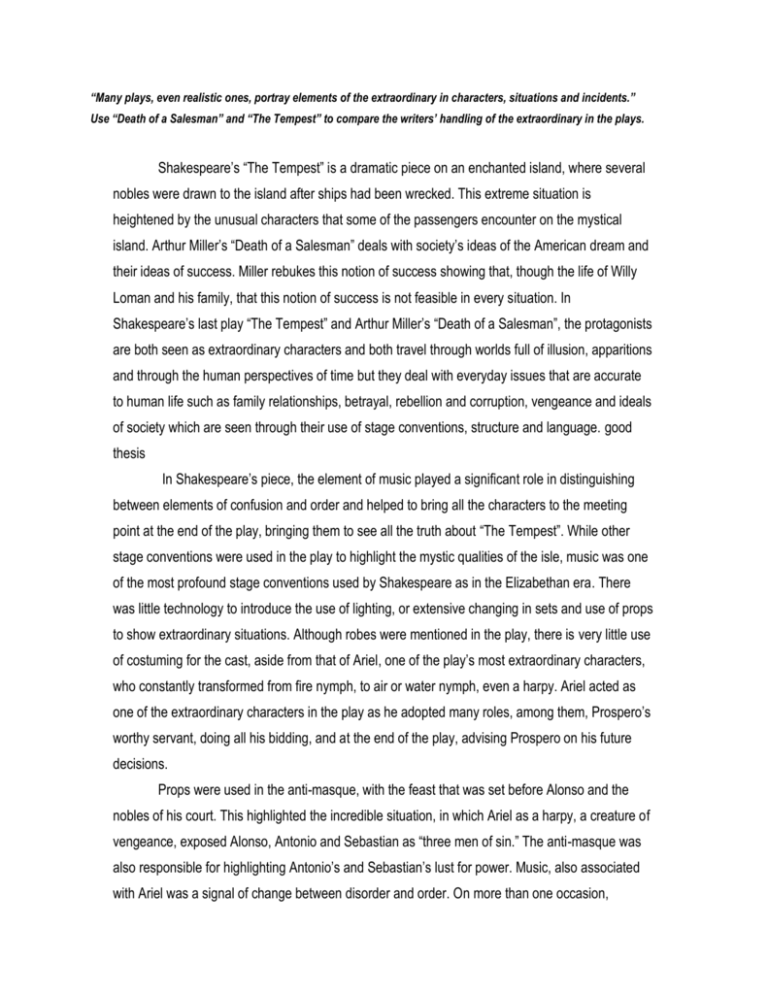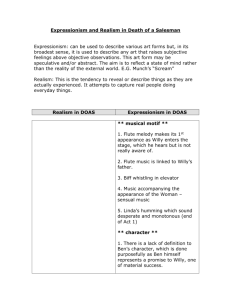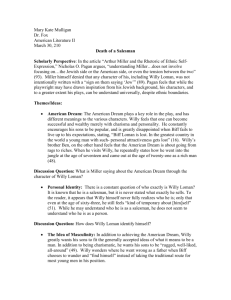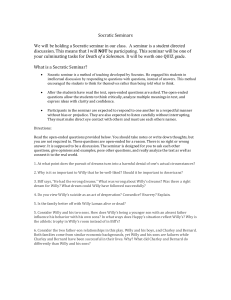“Many plays, even realistic ones, portray elements of the
advertisement

“Many plays, even realistic ones, portray elements of the extraordinary in characters, situations and incidents.” Use “Death of a Salesman” and “The Tempest” to compare the writers’ handling of the extraordinary in the plays. Shakespeare’s “The Tempest” is a dramatic piece on an enchanted island, where several nobles were drawn to the island after ships had been wrecked. This extreme situation is heightened by the unusual characters that some of the passengers encounter on the mystical island. Arthur Miller’s “Death of a Salesman” deals with society’s ideas of the American dream and their ideas of success. Miller rebukes this notion of success showing that, though the life of Willy Loman and his family, that this notion of success is not feasible in every situation. In Shakespeare’s last play “The Tempest” and Arthur Miller’s “Death of a Salesman”, the protagonists are both seen as extraordinary characters and both travel through worlds full of illusion, apparitions and through the human perspectives of time but they deal with everyday issues that are accurate to human life such as family relationships, betrayal, rebellion and corruption, vengeance and ideals of society which are seen through their use of stage conventions, structure and language. good thesis In Shakespeare’s piece, the element of music played a significant role in distinguishing between elements of confusion and order and helped to bring all the characters to the meeting point at the end of the play, bringing them to see all the truth about “The Tempest”. While other stage conventions were used in the play to highlight the mystic qualities of the isle, music was one of the most profound stage conventions used by Shakespeare as in the Elizabethan era. There was little technology to introduce the use of lighting, or extensive changing in sets and use of props to show extraordinary situations. Although robes were mentioned in the play, there is very little use of costuming for the cast, aside from that of Ariel, one of the play’s most extraordinary characters, who constantly transformed from fire nymph, to air or water nymph, even a harpy. Ariel acted as one of the extraordinary characters in the play as he adopted many roles, among them, Prospero’s worthy servant, doing all his bidding, and at the end of the play, advising Prospero on his future decisions. Props were used in the anti-masque, with the feast that was set before Alonso and the nobles of his court. This highlighted the incredible situation, in which Ariel as a harpy, a creature of vengeance, exposed Alonso, Antonio and Sebastian as “three men of sin.” The anti-masque was also responsible for highlighting Antonio’s and Sebastian’s lust for power. Music, also associated with Ariel was a signal of change between disorder and order. On more than one occasion, Stephano and Trinculo are stopped in their tracks while plotting to kill Alonso and Gonzalo. Each time, Ariel’s music interjects and calls them to attention, waking them from their sleep in time to prevent murder and usurpation on the island. Before the anti-masque is presented, the stage directions ask for “strange and solemn music”. This created a sense of tension and suspense in the reader, allowing one to sense the feeling of mystery of what was going to take place. Music in the play was first seen drawing Ferdinand to Miranda, “This music crept by me upon the waters, Allaying both their fury and my passion With its sweet air. Thence I have followed it (Or it hath drawn me, rather)” The music was also responsible for drawing everyone together at the reconciliation as it lead characters to various places along the plot, resulting in all gathering at the same place. In essence, it was one way that Prospero was able to control the characters and his plan on the island. He was able to lull characters to sleep and to wake them. There was also a parody of the seriousness of the music in this play as Stephano and Trinculo singing their drunken music, breaking the importance of it, displaying music in a light tone, as a precursor to disorder, rather than restoring order as Ariel’s music did. When “Ariel plays the tune on a tabor and pipe” it is meant to inculcate fear, as the music playing the tune seems to be coming from nowhere, but the three miscreants misinterpret it and Caliban describes it as music of the isle. Eventually, they follow the music, falling into Prospero’s trap, without even knowing it. How is this liked to the question of the extraordinary? While in Shakespeare’s time music was at the centre of stage convention and technology, Miller was afforded the use of more stage conventions during his period of writing, which would have allowed the use of more stage conventions., making it easier to highlight the bizarre situations and characteristics of Willy that add to the element of the unnatural in the play. Music was a way of signaling that Willy was about to leave reality and enter his own world, filled with scenes of happier days in his life, and even conflicts that changed his family’s lives forever. The music acted as a precursor of disorder, like that of Stephano’s singing in The Tempest. It also gave insight to who may have been appearing in the scene of recall of the nature of what was about to be replayed in Willy’s mind. “[T]he gay music of the boys is heard” signifies to Willy and the audience a happier time, where things did not seem as serious as they were in the present. It was also a memory of one of Willy’s happiest times, when Biff was going to play the most important game of his life, according to Willy. Another stage convention used by Miller to handle these extreme situations was lighting, which also dealt with Willy and the workings of his mind. In the restaurant, “The light of green leaves stains the house,” signifies entry into Willy’s world. The lighting was also used to emphasize their extreme poverty, along with the use of props. For instance, “[a]s more light appears, we see a solid vault of apartment houses around their small fragile home”, which shows that the lighting at this moment emphasizes the size of the neighbouring buildings as they are given the impression of preying over the values of those in the house, and the values of the society is preying upon the values that Willy Loman tries to hold onto. The props that show their extreme poverty could be seen in the kitchen, where there were only three chairs, but four members of the family. The little props that they have were never properly functioning and this was accentuated by the fact that they were always paying for things, including the mortgage of their house. Willy describes himself as “always in a race with the junkyard” which epitomizes the problems that they have with all the appliances that they have in the house and are not able to pay for. The props also are a method of revealing one of the reasons why Willy’s mind is in such a state because he continually tries to be a salesman, in order to be able to have the things necessary to raise and support his family. The punching bag, which Willy brings home to a younger Biff and Happy, was a clear indication of his yearning to please his children as a successful father. The Tempest is structured into various subplots, each resolved at the end of the play, situations which Shakespeare uses to deal with major issues that emerge such as usurpation, betrayal, family relationships, vengeance and forgiveness, involving each character in the play. The use of many subplots is one aspect that makes Shakespeare’s play seems strange and unnatural as it lends the idea that many things are happening at the same time. The major spectacle of the anti-masque was when there was the image of the banquet in front of Alonso, Gonzalo, Sebastian and Antonio. At the same time, There is the visual spectacle of the “several strange shapes, bringing in a banquet, and danc[ing] about with gentle actions of salutations” and Ariel, as one of the most stirring visual spectacles of the play, a harpy. While all this is going on, Prospero’s role as the writer of the script of this play within a play is clearly seen as he stands above everything, looking down at his “work of art” as it was often described. This anti-masque was the turning point of the play, the subplot that dealt with betrayal in the world of the court and showing that there was a question of whether humans were more civilized than these creatures of the island since “Such shapes, such gesture and such sound, expressing (Although they want the use of tongue) a kind Of excellent dumb discourse.” This subplot which dealt with the civility of humans was also explored through Caliban as he spoke in verse, opposed to his self-inflicted masters, Stephano and Trinculo, who spoke in prose. Caliban’s character from one perspective could reveal his plan to use Stephano and Trinculo to kill Prospero after which he could take his role as the rightful ruler of his island. “Good my lord, give me thy favour still. Be patient, for the prize I’ll bring thee to Shall hoodwink this mischance. Therefore speak softly; All’s hushed as midnight yet.” As Caliban leads Stephano and Trinculo to Prospero, some critics say that he knows that these beings are not any smarter or more civilized than he is, as they get distracted by robes that appear, and Caliban has to lead them away from them assuring them that more riches are in store, once they kill Prospero. The conversations between Ariel and Prospero as they are orchestrating the plans of the island are also shown by Shakespeare, creating more of a dynamic element in the play. While these various things were happening, Miranda and Ferdinand were getting to know each other, playing chess and carrying logs. What makes this play even more extraordinary was the fact that all these things happened in the mere space of 6 hours or less. Similarly, structural elements of “Death of a Salesman”, such as scenes of recall and brevity of plot expound Miller’s themes, existent in most family relationships between each other, the perception of success and the parent’s idea of success for their children, as Willy expects Biff to become a salesman and work in an office. The complexity of Miller’s plot was at a minimum as the plot of the play lasted 24hours and comprised Biff’s return home, his trip to Bill Oliver and Willy being fired, after which he commits suicide. In between these moments and occurrences, the dimensions of Willy’s mind fills in the gaps and shows the aspects of the play that make it extraordinary. However short it may be, the plot deals with the issues of family relationships, poverty, Willy’s situation and the inevitability of his failure, leading to the tragedy that beholds those who believe that “attention must be finally paid to such a person.” Through conversation, we are able to see family relationships, for example when Biff complains about his father, stating “He always, always wiped the floor with you.” after experiencing Willy talking to himself. Biff’s speech showed the relationship between Willy and Linda, as well as how he felt about his father, his mind’s conditions and how he treated his wife. Biff is also characterized in his speech in that he does not allow Willy to disrespect Linda and he seems to be the only character not totally brainwashed into the system of the American dream of success. You re straying badly from the question The part of the play that made it seem as though there was a complicated plot was Miller’s employment of scenes of recall, or flashbacks that went through Willy’s mind, especially when he felt that he could not cope with situations in the real world at present and also as he was guilty. The scenes of recall provided us with reasons and answers that Willy and Biff were too ashamed to talk about, such as the woman, Willy’s mistress, who only the two of them knew about. Prior to this revelation, Biff shows that he is aware of something that the audience is only aware of because of one of Willy’s flashback which involved the woman’s laughter. Throughout the flashbacks, we learn about Ben and the audience sees his role as the “undertaker” as he repeats “Time, William, time”, which suggests that time is running out of his life and everything is coming to an end. Shakespeare’s use of language techniques, rhyme and literary devices also brings up the extraordinary incidents of “The Tempest”, as well as the issues between the characters of the island. The masque, which begins with three goddesses of Greek mythology, displays a poetic form, contrasting from the speech that Shakespeare used throughout the rest of the play. The insertion of the goddesses and their language that they speak injects another element of magnificence, magic and majesty, to add to it’s already supernatural plot. The speeches of the gods also included a plethora of images and other literary devices which described many wondrous things such as “You nymphs, called naiads, of the windring brooks, /With your sedged crowns and ever harmless looks,” which leads up to the climatic moment of the masque, which is eventually ruined as Prospero’s mind runs on Caliban, the butler and jester and their plot to murder him. This speech calls all the mystical creatures to the stage, creating a visual spectacle, due to the use of Iris’ language and poetic speech. Rhyming was also encompassed in the epilogue of the play, suggesting the fact that it is not at all a part of the play but separates the surreality of the play from the real world, from which Prospero speaks as the actor himself, rather than the character. In the more comic scenes of the play, Shakespeare incorporates the manipulation of literary devices such as stichomythia, when Sebastian and Antonio speak single lines back-toback, creating a fiery dialogue with an increasing comic element. Even during the anti-masque, Stephano was able to see it in a comical light, describing the strange shapes as “a living drollery” and exclaiming “Now I will believe/That there are unicorns;” The theme of conspiracy in the play is shown throughout the world of the court and the world of Caliban, Stephano and Trinculo. In the scenes 3.2 and 3.3 where Stephano, Caliban and Trinculo are plotting to kill Prospero, the king of the island, juxtaposed with Sebastian and Antonio, talking about their plot to kill Alonso, to become king of Naples on their return to the island. Just as Shakespeare uses language to highlight the themes, Miller is able to show Willy’s ludicrous behaviour in a light where the reader is able to sympathize through the use of plain, accessible language, a multi- sensory approach and repetition. Miller’s use of plain, accessible language proved that he aimed to target the everyday American man who struggles, just like Willy, to be successful in the corporate world. Miller also uses the American dialect to achieve the same effect. His main target is also highlighted when the requiem is performed, placing Willy’s grave into the audience, highlighted that Willy could be any man, the average American who died because “he was so wonderful with his hands” but also, “he had the wrong dreams.” This made it easier for the audience to understand his plight as well as feeling sympathy for him because his only dream, as Happy said, was “to come out number-one man.” Miller’s writing used repetition to continuously remind the readers and Willy of his misfortunes, as well as his desire to take his life. Ben, his dead brother talks about the importance of time and the time running out, which refers to Willy joining him in the afterlife. He always talks about time whenever Willy sees him, as well as mentioning that he should come with him on his adventures or journeys. Finally, Willy’s last journey takes him to the end of his life and he joins Ben when his time finally ran out. The act of Linda darning stocking was also a repeated idea, which emphasized their poverty as well as reminding everyone of Willy’s relationship with the woman, as Willy was shown (via one of his scenes of recall) buying her new stockings, which was juxtaposed with Linda mending hers. The fact that she had to mend her stockings also indicated to the audience her extreme situation of poverty, as well as how insignificant she was to Willy’s life. This statement could be supported by the fact that he was always talking down to Linda, telling her to be quiet and to stop interrupting, even when she wasn’t. All in all, Linda was seen as an oppressed character in the novel as she provided and helped her husband and also took his mistreatment, with extreme grace and strength. In both plays, we are able to see the lives of everyday people being portrayed. The protagonist of each play was required to live up to a certain expectation, and made decisions that changed the way life should have been for them. Both Shakespeare and Miller used effective and forceful techniques to display that their characters, which were placed in extraordinary situations, had to deal with the same elements of the rules of a society and situations that most simpleton human beings have to stomach on many occasions. This is unrealistically long. You would not reproduce this in an exam. The reason why it is long because it is n ot a focused answer to the question. You gave me everything you could think of about both plays but strayed all over the place from the question. Begin with a clear sense of what is extraordinary, in what context and what ways the playwright chooses to manifest this as so. 6/5/5 16/40







